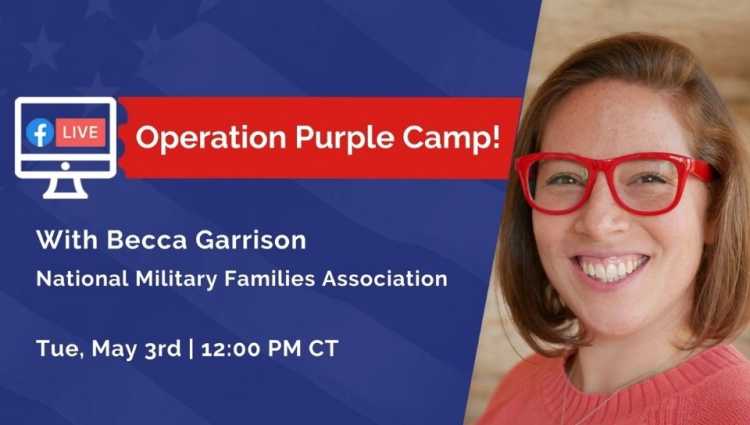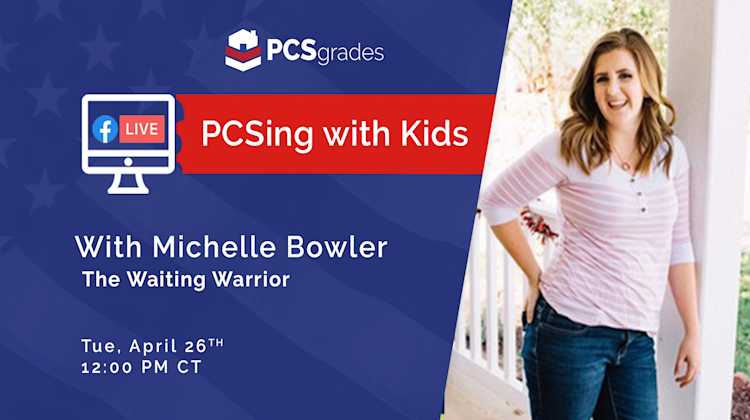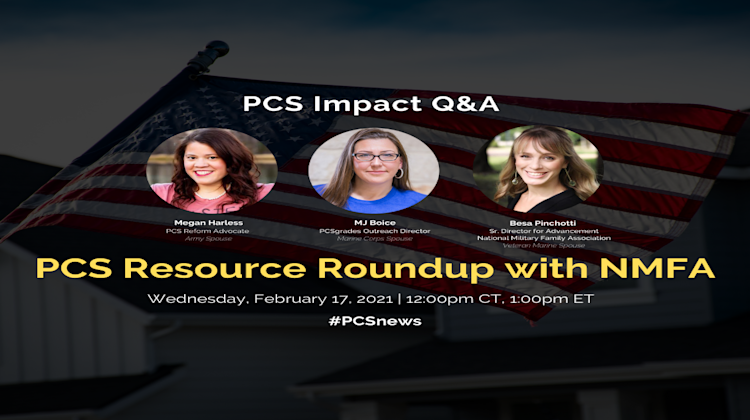Webinar: Operation Purple Camps
by Lizann Lightfoot - May 24th, 2022

Our Guest: Becca Garrison of the National Military Family Association
I joined the NMFA team in September 2021, and it feels like coming home. I was raised in a military family, and have multiple family members in various military branches. My Dad and brother are Marines, and my sister-in-law is Army. Getting a chance to spend time with military families and support that journey is truly exciting.
What is Operation Purple Camp?
It came to be in 2004. Until that point, NMFA was primarily known for advocating for military families on the Hill. We wanted to advocate and do some direct service. We have a virtual camp for kids ages 3-12 that we run each summer, and then in-person camps for kids ages 6-17. These are sleepaway summer camps where kids can be one with nature and hang out with other military kids. We also have Family Camps where we give families a fun, supported weekend together to connect with each other.
Did you attend summer camp when you were little?
Yes, my family was stationed in Germany when I was age 6-9, and we came across a Girl Scout camp there called Camp LachenWald, or Laughing Wood, so I was able to participate with people who mostly spoke English. Some of our Operation Purple sites feel rustic, but many of them are quite nice, so this is not your Grandma’s camping experience!
What is the Family Program for Operation Purple Camp?
We have several great family programs. The first is a Family Retreat, for those going through deployment. We consider this to be the 18 months before, during, or after a deployment, when we need family to feel more connected. The Family Retreats do some workshop work with the American Red Cross, but it is also hands-on activities like doing a canoe ride, ropes course, or outdoor activity together.
Our Healing Adventures are for families with a member who is wounded, ill, or injured. They are similar to the Retreats, but the activities are designed to accommodate those wounded members.
Our Parent-Teen experiences are new this year. We did some research and learned that military teens need a little extra help. So we are inviting a parent to bring their teen to camp and build a special bond between them, to build up mental resilience.
What’s new for Operation Purple Camps this year?
The Teen Camps are new this year, and they are staying in college dorm rooms while also doing outdoor activities. We are partnering with Camp Southern Ground in Georgia, and they will be doing camps for kids supporting a family member who is wounded, ill, or injured. And finally our Texas Camp will have a teen-only section so you can send all the kids, but the teens will have their own unique experience.
We continue to focus on helping kids connect with each other and enjoy the outdoors. Unfortunately, our registration this year is closed. We had 5,000 individuals apply for 1,500 beds. We are trying to get as many beds as possible to serve more military families.
Are Operation Purple Camps all over the country?
Yes, every year we focus on the best ways to serve military families. You can see locations on our website, www.MilitaryFamily.org and check out the Operation Purple programs there. We have family experiences from Florida to Hawaii, and camps from Georgia to Alaska, so we change up the locations a little bit each year. Our Family Programs are still open, because those are available throughout the year. Our final experience this year is in November, and registration closes in October. Registration next year will probably open in February.
Tell us about the registration process for Operation Purple camps.
We don’t do first-come/first-served, because we want to serve families with the greatest needs. We do prioritize new campers, so everyone can get a chance to experience it. Then we also look for families that are either in the deployment cycle or in that wounded category. You can see more details about our selection process on the FAQ portion of our website.
Who are the counselors at these camps?
We are excited about the organizations we partner with. They undergo training and hire staff each year to make sure they are prepared to work with military kids. We have been working with a group called BLOOM which empowers military kids, so they provide information about what to say or not to say to military kids. We make sure our counselors have that cultural competency to work with military families. We provide a classic camping experience with outdoor activities, canoeing, eating in a dining hall, etc. Many counselors tell us that hosting Operation Purple Camps is their favorite week of the year.
Are there children who have become counselors after being campers?
There are a few people who experienced Operation Purple camps as a military kid, and now are working as counselors at one of our partner sites. We are looking at various ways to engage with alumni, because we don’t want campers to lose those connections when they move.
What ages of children can participate in Operation Purple Camps?
Every camp has a different age range, so look at the details for the camp you are applying for. It could be 6-14 or 7-17, depending on the counselors, their training, and the facilities available there. Our virtual camps are designed for children ages 3- 12.
If you have already been accepted, then get PCS orders, we can try to get you a spot in another camp closer to your new location, or we can prioritize you for next year to get you to the top of the list. We always try to open more virtual experiences and camps that will include even more kids this year.
What is the cost of Operation Purple Camps?
Camp is free! That is our goal, and that’s why we have funders who help send kids to camp each year. Families have to pay for their clothing and some camping supplies, but we don’t want finances to be a barrier to anyone going to camp. We do have a “hold my spot” fee for $25, which you receive back if your child attends, or you can donate it to be used for another family next year. That is just to ensure people attend and follow through with the commitment, because we want all our beds to be filled!
What about transportation to camps?
Travel and transportation is up to the individual family, so you need to make sure you have coordinated that they can get to camp and home from camp. Sometimes families apply for the state where they are PCSing. It doesn’t have to be in your current location. We have a dream of eventually offering scholarships to help kids get to camp, but we don’t have that in place yet.
What’s your favorite activity the campers do?
I’m a big fan of anything that makes people do funny movements or make funny noises, so camp songs and camp chants are my favorite parts. It’s amazing how the most sarcastic and angry teenager can really just let loose and belt out song lyrics when they get caught up in the ambience of camp. There’s something about a campfire that just makes you want to hoot and holler!
Where can people sign up or register for Operation Purple Camps?
All this information is on our website, MilitaryFamily.org. Go to Programs, then Operation Purple, and you’ll see all the options for individual camps, Family Camps, and also the virtual camps. There’s an online application form where we ask some information about you and your family, so we make sure we can support your family properly.
We do have a wait list, where we put every family who is eligible for camp. We are serious about wanting to fill every space at camp, so we will call people up until the day before camp begins. We don’t share numbers on the wait list, because it depends on the age and gender configuration of the spaces available, so we can’t assign a number order to the list.
What does an average day at camp look like?
The day starts early with a flag raising, singing songs, and some announcements. Then there’s a dining hall breakfast. The next thing is various group activities like arts and crafts, archery, team sports, ropes courses, tie-dying tee-shirts, etc. Then there is lunch and afternoon break time. We also do Cabin Chats in the afternoon to take a little time to talk, journal, or listen in to get to know each other better, feel stronger and more empowered. In the evening, there is dinner followed by an evening program. Sometimes there’s a campfire, a barn dance, or a cool activity--so always check the packing list for any unique items!
It’s a wonderful week overall, and each location puts their own spin on it, so no two experiences are exactly the same.
The Family Programs are 3 days--Friday through Sunday. We start with team building and ice breakers on Friday, then workshops on Saturday morning, where everyone realizes they are in a comfortable group of people with shared experiences. There are lots of great team-building activities, ropes courses, family movie night, and three meals per day during the experience.
We try to prioritize families who haven’t attended before, but we encourage people to apply even if they have attended before, because there is always the chance things will open up on the wait list.
What is your favorite part about Operation Purple Camps?
Our camps do two different things. First, there’s a hype and energy that you get from camp--feeling important and excitement. That’s probably my favorite part. But it’s also about the heart--especially for the Family Experiences. Teens really open up during the Red Cross sessions, and families always say the time together is really important. There’s a powerful experience in sharing challenging experiences and figuring them out together.
We are seeing more families realizing that the time and relationships we have together are so important. So we get really excited when families show up ready to share.
What are the Red Cross sessions like?
We have a few different workshops, and they are a little different at each camp. There’s the Healing Adventures and Family Retreats, where the Red Cross comes in for a 90-minute session. The Teen Adventures are one overnight, and the Family Camps are a long weekend. We don’t want to have too many workshops, but learning how to build your resiliency together can really help your experiences for the rest of the weekend. So we do that right at the beginning of the weekend. We want to think about the relationships you need, and how can we use experts like the Red Cross to come and speak to our families in a way that will help them next time they are facing those challenges.
This experience is really for YOU and your family, so we ask you to reach out so we can hear from you and what you need. Most of my team is former or current military spouses, so we want to listen and hear from you.
Can you accommodate children with special needs?
It depends on the individual camp and their own staff and training programs. If you let us know that you want to go to camp and your child has a specific need, we will check in with the camp and see if they can accommodate that. We do have a lot of camps that serve kids who are neuro-divergent. This is an area where we want you to communicate with us and let us know what we can do better.
What other programs does NMFA have besides the Operation Purple Camp experiences?
You can think about NMFA serving families in three ways: the programs we have discussed, the advocacy we have always been known for, and the research that we do. We have a small but mighty research team. In the past few years, we have reached out to thousands of military teens to create a Teen Report that shares the true experiences of military kids. We know that separations and PCSing is hard, and we understand that, which is why we have partnered with Bloom: Empowering the Military Teen. But we also learned that mental health is a real challenge. Military teens are highly likely to consider joining the military before leaving school, and they are struggling before they get to that phase. So we want them to have the right words to talk to each other about how they are doing and what kind of support they need.
At our recent State of the Military Family event, those Bloom teens and others from a panel spoke to the Secretary of Education, Miguel Cardona, and it was incredible to see him listen and tell them that he’s looking to see each of them have a rich and amazing school experience. We are so excited to be partnered with them moving forward.
There is great information available from our Advocacy Team. We have a spouse education and employment fund. So we give out money for education, re-certification, and entrepreneurship, so we want to see how we can help you with employment goals.
Talk to us about the Military Spouse Employment Whitepaper.
I think it’s wonderful, and you can check out the Whitepaper on our website and see some of the goals we have. We want organizations out there to understand what makes military spouses special and worth hiring, and we want leaders to understand the challenges military spouses face--moving across state lines, or living overseas. We want you to have the experience and education you need while you are supporting your service member.







